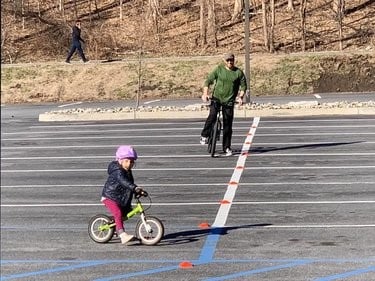The Altamont Enterprise Regional
‘Reassurance, routines, and regulation’ critical for children in isolation, expert says
Monday, March 23, 2020 - 20:36

- Photo by Tim Wiles
The empty parking lot at the Guilderland Public Library was the perfect spot on March 21 — a sunny Saturday — for Andy Choens to teach his 4-year-old daughter, Leila, how to ride a bike. Jessica Griffin, a professor of psychiatry and pediatrics at the UMass Chan Medical School, told The Enterprise this week that children require some degree social contact to develop resilience to trauma and stress, and that one supportive guardian can make a world of difference during this troubling time. “She had a great time riding in the parking lot,” said Andy Choens. “Maybe, when this is all over, we could do a skills day and invite the community!”
In recent weeks, daily life has been upended by what writer Geoffrey Dyer describes as an “existential inconvenience.” Many people are not under a mortal threat from the coronavirus and its accompanying disease, COVID-19 but, in order to protect those who are vulnerable and to prevent the collapse of the medical system with its spread, everyone must remain in their homes and restrict social contact.
Children, now home from school until at least April 1 — but probably longer — are especially vulnerable to the psychic tolls of the global response of social distancing.
“Socialization is key to children’s healthy development, impacting their emotional, psychological, and cognitive functioning,” Jessica Griffin, PsyD, told The Enterprise in an email this week.
Griffin is an associate professor of psychiatry and pediatrics at the UMass Chan Medical School.
“We are in an unprecedented and frightening time for children and families,” Griffin said. “Social distancing, coupled with the stress on families (e.g., heightened anxiety, fears regarding finances, etc.) could mean stress on children. We know that stress, without the buffering impact of social support, can become toxic on children – negatively impacting their emotional health as well as their physical health.
“The good news is that although stress can become toxic to children’s well-being,” Griffin continued, “the number-one factor in preventing that stress from becoming toxic is the presence of a supportive and nurturing caregiver. Supportive relationships promote our resilience to stressful events — so it is critical that we maintain our social connections with one another, however we can, while remaining physically safe.”
Griffin said that, while many people are fortunate to have technologies that allow them to communicate across a distance, children in families that are not able to afford these technologies are not necessarily going to be crushed by the impacts of isolation.
“Science supports that children who have adequate supports in place, even if it is just one supportive, nurturing and available caregiver,” Griffin said, “will bounce back after a traumatic or stressful situation.”
In psychology, the ability to recover from stress or trauma is called resilience. Griffin detailed her basic strategy for developing resilience in children during this difficult and often scary time: Reassure them, keep them on a routine, and help them with self-regulation.
Reassure
One of the challenging aspects of social distancing — for anyone — is internalizing the reason it’s necessary despit
